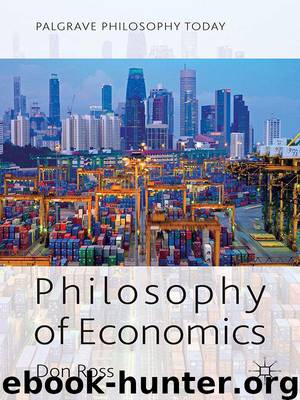Philosophy of Economics by Don Ross

Author:Don Ross [Ross, Don]
Language: eng
Format: epub
Publisher: Palgrave Macmillan
Published: 0101-01-01T00:00:00+00:00
Figure 3.18 Incomplete information game with payoff vector θ ∈ ℜ8
Morris and Shin (1998) develop a global game in which a bank run – all depositors wanting to withdraw their funds at the same time – becomes a unique equilibrium if a parameter driving the expected rate of return for longer-term depositors falls below a specifiable threshold. Such modeling is potentially valuable to market regulators, since it offers the promise of indicating when exogenous intervention might be justified to avoid a value-destroying crash.
This point provides another basis for emphasizing the importance of institutions in economics. Abetting coordination by providing publicly visible signals is among the basic functions of the majority of human institutions, both formal and informal. As an example of the former, a currency supported by laws mandating its acceptance by registered businesses allows agents to store their wealth in a liquid and generally fungible medium. What it means for something to be money is that users are coordinated in their expectations that others will accept it as payment. An example of an enormously influential informal institution is the socially accepted weekly calendar, which allows people to efficiently organize their availability for business transactions at the same time as one another, and also coordinate their leisure hours. Thus entertainment services can be efficiently marketed, while business time wasted searching for suppliers who have gone fishing is minimized. The market itself is often conceived in a way that abstracts from specific institutions, as meaning simply all the information about valuations encoded in histories of exchanges. But when we talk about ‘actual markets’ in an applied context, we are invariably referring to structures that are stabilized and identified by mixtures of formal and informal institutions, for example firms, named products, posted prices, and legal specifications of responsibilities and rights recognized as belonging to occupants of commercial roles. Laws and regulations governing who gets to do what with resources – that is, the network of property control in a society – is the most fundamental institutional understructure of its economy.
An economy with an under-developed infrastructure of institutions for assigning ownership rights, structuring market participants’ expectations and sanctioning breaches of contracts and other promises is typically inefficient to the point of trapping most of its participants in poverty. Acemoglu and Robinson (2012) synthesize decades of scholarship by development specialists to make a persuasive case that missing or ineffective governance institutions are the overwhelmingly most important factor in explaining why national income averages around the world are not smoothly distributed, but instead form clusters around three widely separated points. Affluence of the kind found in OECD countries such as Canada, Sweden and South Korea, with per capita income in the neighborhood of $40,000 per annum, is one equilibrium in a society-wide coordination game. Widespread poverty of the sort that blights Haiti, Sierra Leone and Cambodia, where per capita income is less than $1,000 per annum, is another such equilibrium. A third equilibrium state with per capita income in the area of $10,000 per annum
Download
This site does not store any files on its server. We only index and link to content provided by other sites. Please contact the content providers to delete copyright contents if any and email us, we'll remove relevant links or contents immediately.
The remains of the day by Kazuo Ishiguro(8999)
Tools of Titans by Timothy Ferriss(8396)
Giovanni's Room by James Baldwin(7346)
The Black Swan by Nassim Nicholas Taleb(7129)
Inner Engineering: A Yogi's Guide to Joy by Sadhguru(6796)
The Way of Zen by Alan W. Watts(6614)
The Power of Now: A Guide to Spiritual Enlightenment by Eckhart Tolle(5782)
Asking the Right Questions: A Guide to Critical Thinking by M. Neil Browne & Stuart M. Keeley(5775)
The Six Wives Of Henry VIII (WOMEN IN HISTORY) by Fraser Antonia(5515)
Astrophysics for People in a Hurry by Neil DeGrasse Tyson(5190)
Housekeeping by Marilynne Robinson(4447)
12 Rules for Life by Jordan B. Peterson(4304)
Ikigai by Héctor García & Francesc Miralles(4274)
Double Down (Diary of a Wimpy Kid Book 11) by Jeff Kinney(4272)
The Ethical Slut by Janet W. Hardy(4253)
Skin in the Game by Nassim Nicholas Taleb(4248)
The Art of Happiness by The Dalai Lama(4130)
Skin in the Game: Hidden Asymmetries in Daily Life by Nassim Nicholas Taleb(4007)
Walking by Henry David Thoreau(3962)
